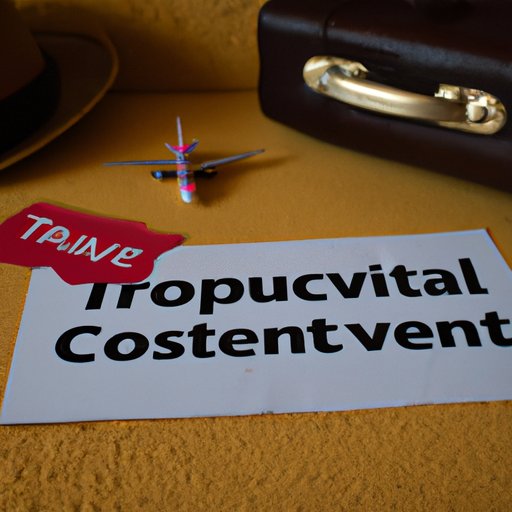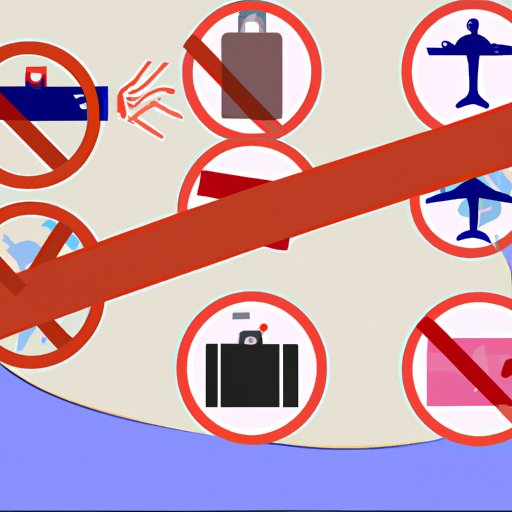Introduction
Travel restrictions are rules that limit the movement of people across borders. They can be imposed for a variety of reasons, such as public health, security, or economic considerations. Travel restrictions can range from bans on certain types of travelers to more stringent measures such as visa requirements or restricted entry points. In recent years, travel restrictions have become increasingly common as governments seek to control the spread of diseases like COVID-19.
The implementation of travel restrictions has raised a number of questions about their effectiveness in controlling the spread of disease, their impact on tourism and local economies, and their potential human rights violations. This article will explore these issues in greater detail, examining the differences in travel restrictions around the world and their consequences.
Exploring Differences in Travel Restrictions Around the World
Travel restrictions vary significantly between countries. Some countries have implemented blanket bans on all travelers, while others have enacted more targeted measures. For example, some countries may require travelers to present a negative COVID-19 test before entering, while others may only allow citizens or residents to enter. As such, it is important to understand the differences in travel restrictions across different countries.
In addition to differences between countries, there are also regional variations in travel restrictions. For example, the European Union has adopted a policy of open borders within the bloc, but has imposed stricter controls on travel from outside the EU. Other regions, such as Central America and the Caribbean, have adopted similar policies.

Understanding the Impact of Travel Restrictions on Tourism
The implementation of travel restrictions has had a profound effect on the global tourism industry. With many countries banning or severely restricting travel, businesses in the tourism sector have been hit hard. Airlines, hotels, restaurants, and other businesses that rely on travelers for their revenue have been forced to lay off staff and reduce services.
The impact of travel restrictions on tourism has also had a ripple effect on local economies. Many businesses that depend on tourism for their income, such as souvenir shops and tour operators, have been forced to close or reduce their operations. This has led to job losses and a reduction in consumer spending, which has had a negative impact on the overall economy.
What are the Legal Implications of Travel Restrictions?
International laws regarding travel restrictions are complex and evolving. In general, countries are allowed to impose restrictions on travelers if they are deemed necessary to protect public health or national security. However, some argue that travel restrictions can be used as a way to discriminate against certain travelers or to impede the free movement of people.
In addition, there are concerns that some travel restrictions could violate human rights. For example, some countries have imposed restrictions on refugees and asylum seekers, preventing them from entering the country. This raises serious questions about the legality of such measures.
Examining Travel Restrictions from a Humanitarian Perspective
The implementation of travel restrictions has had a significant impact on refugees and asylum seekers, who are often unable to access the protection and support they need. Many refugees and asylum seekers have been stranded in dangerous or difficult situations due to travel restrictions, making it difficult for them to access basic services such as healthcare or education.
Non-governmental organizations (NGOs) have played an important role in responding to the humanitarian challenges posed by travel restrictions. NGOs have provided aid and support to refugees and asylum seekers, as well as advocating for their rights. They have also worked to raise awareness of the plight of those affected by travel restrictions.

The Economic Consequences of Travel Restrictions
The implementation of travel restrictions has had a significant impact on the global economy. The restrictions have disrupted global supply chains, resulting in delays and disruption to businesses. In addition, the decline in tourism has led to a decrease in global trade and investment, as fewer people are travelling and spending money abroad.
The economic consequences of travel restrictions have been felt particularly acutely in developing countries, where tourism is a major source of income. These countries have lost billions of dollars in revenue due to the decline in tourism, leading to job losses and reduced government revenue.

Investigating How Different Countries Enforce Their Travel Restrictions
Different countries have adopted different approaches to enforcing their travel restrictions. Some countries have implemented strict penalties for violators, while others have relied on voluntary compliance. In addition, some countries have employed technology to monitor travelers and ensure compliance with travel restrictions.
Technology has played an increasingly important role in implementing travel restrictions. For instance, some countries have deployed facial recognition systems to identify travelers and track their movements. In addition, apps such as contact tracing have been used to monitor travelers and alert authorities if they are suspected of violating travel restrictions.
Conclusion
In conclusion, this article has explored the various impacts of travel restrictions around the world. It has looked at the differences in travel restrictions between countries and their consequences, including their impact on tourism, local economies, and global trade. It has also examined the legal implications of travel restrictions and their effects on refugees and asylum seekers. Finally, it has investigated how different countries enforce their travel restrictions and the role of technology in doing so.
Overall, this article has shown that travel restrictions can have far-reaching consequences for both individuals and businesses. It is therefore important that governments carefully consider the potential impacts of their policies before implementing travel restrictions.
This article has highlighted some of the key issues surrounding travel restrictions, but further research is needed to fully understand their implications. In particular, more research is needed to examine the long-term effects of travel restrictions on global trade, investment, and local economies.
(Note: Is this article not meeting your expectations? Do you have knowledge or insights to share? Unlock new opportunities and expand your reach by joining our authors team. Click Registration to join us and share your expertise with our readers.)
